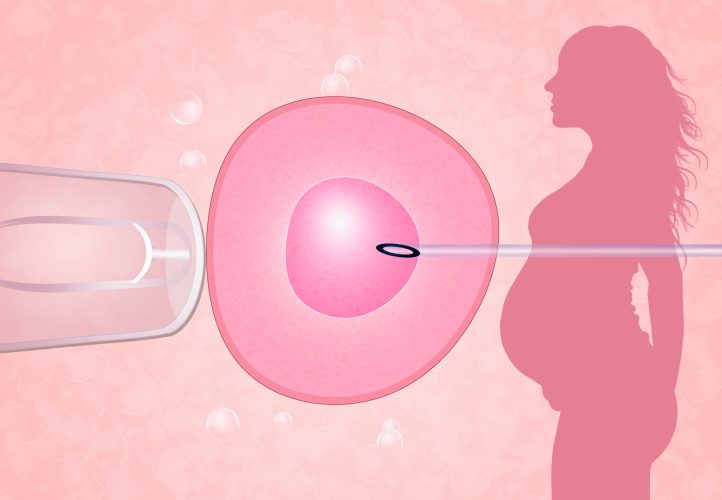- NIPT
- PGT-A
- cWES

NIGM is a form of Non-Invasive Prenatal Testing (NIPT) based on next-generation sequencing using cell-free DNA (cfDNA) in maternal blood to evaluate possible chromosomal conditions in pregnancy. It can be performed as early as 9 gestational weeks using a single tube of blood.
NIGM offers the prenatal test with a focused and clinically relevant menu that screens for chromosomal aneuploidies, specific sex chromosome aneuploidies, and pathogenic microdeletions/duplications.
 Simple
Simple  Accurate
Accurate Proven >99% sensitivity based on a test of more than 70,000 pregnancies
 Fast & Convenient
Fast & Convenient - Quick test from sample preparation to report generation within 24 hours
- Simplified operation: Automated and localized data analysis and report
 Flexible
Flexible - Compatible with most standard NGS library prep kits and bioinformatics tools
- Offering flexible options for both manual and automated workflows

Preimplanation Genetic Testing for Aneuploidy (PGT-A), which is applied to identify chromosomal abnormalities and that represents the broadest indication to preimplantation genetics at present. Preimplantation genetic testing for aneuploidy identififies chromosomal abnormalities in embryo samples for the research of in vitro fertilization (IVF) or intracytoplasmic sperm injection (ICSI). These genetic insights may increase the probability of success for future pregnancies and healthier future generations.
 Easy-to-use
Easy-to-use Automated and simplified sequencing and data analysis workflow
 Fast
Fast Quick test from sample preparation to final report within 24 hours
 Flexible
Flexible Compatible with common used NGS library preparation kits and bioinformatics tools
 Sensitive
Sensitive Accurately detect different types of chromosomal mutations even in a low copies

Clinical diagnostic whole‐exome sequencing (WES) is a powerful tool for patients with undiagnosed genetic disorders. WES employs high-throughput sequencing of more than 20,000 genes per individual, enriched through sequence capture technology. WES targets all protein-coding regions (~1% of the whole genome) responsible for 85% of known disease-causing variants. It allows for molecular diagnosis of genetic diseases and enables the exploration of novel mutations and new pathogenic mechanisms. Compared to whole genome sequencing, WES has the advantage of a greater sequencing depth and delivers more effective data.For patients with symptoms of genetic disorders, clinical exome sequencing plays an important role in quickly identifying potential variants. Clinical exome sequencing offers a one-step solution for challenging issues, such as diagnosing patients with genetic heterogeneity or atypical presentation, where it is unclear which genes are causing the specific genetic condition.
 Easy-to-use
Easy-to-use Automated and simplified sequencing and data analysis workflow
 Fast
Fast Quick test from sample preparation to final report within 2 weeks
TB-tNGS
CNV-seq
Carrier screening

Drug-resistant TB (DR-TB) refers to a TB infection that is resistant to one or more anti-TB drugs. The ability of TB to resist anti-TB drugs represents a major barrier to TB diagnostic, treatment, and eradication efforts. Since Mtb is continually adapting to new anti-TB drugs and evolving cognate resistance mutations, there is a need for a faster and more accurate method to distinguish drug-resistance properties.
NGS is fueling the future of the DR-TB research landscape. tNGS workflows can be applied to TB genomic investigation, providing crucial and precise TB detection and drug resistance profiling. that can help doctors to make the best decisions on multiple and extensively drug-resistant tuberculosis (M/XDR-TB) treatment plans in time.
 Accurate data performance
Accurate data performance Accurate characterization of nucleotide-level genetic polymorphisms.
Detailed sequence information for multiple gene regions or whole genomes.
 Wide range of annotation
Wide range of annotation Detection of resistance to a wide range of first and second-line anti-tuberculosis drugs.
Detection of mixed infection and heteroresistance down to 3% of subpopulations.
 Automated workflow
Automated workflow Automated and simplified sequencing and data analysis workflow.
Quick test from sample preparation to final report within 24 hours.

Chromosome aberrations, including aneuploid, triploid and deletion or duplication of large chromosome segments, are a major cause of birth defects. Additionally, copy number variant syndromes (CNV syndromes), which are caused by pathogenic copy number variations (pCNVs), lead to intellectual disability, multiple congenital anomalies, autistic spectrum disorders and other diseases.
GeneMind CNV-seq solution based on high-throughput sequencing GenoLab platform, it’s able to detect genetic aberrations, including chromosome aneuploidies and CNVs larger than 100 kb. This solution is of great importance to assist the analysis of miscarriage genetic factors and to help doctors well guide couples to get pregnant again more scientifically.
 Wide detection range
Wide detection range Aneuploidy, large fragment deletion/duplication, and CNVs over 100 kb can be detected in one time
 Accurate data performance
Accurate data performance High detection accuracy with good data stability
 Fast and easy
Fast and easy Provide manual and automated library preparation workflow, sequencing data is automatically imported into the bioinformatics analysis system
 Economical and flexible
Economical and flexible Optional to select single or dual flowcell, NIPT and CNV-seq can be sequenced at the same run

GeneMind ESC solution is based on the latest Carrier Screening Guidelines from the American College of Medical Genetics and Genomics (ACMG). It screens for over 200 single gene diseases, including autosomal recessive genetic diseases and X-linked recessive genetic diseases. It helps couples of childbearing age screen for carrier status of pathogenic variations in their own single-gene recessive genetic diseases, allowing them to know the potential reproductive risks, effectively prevent birth defects and avoid the tragedy of having an affected child. The program also includes screening for the MTHFR 677 locus related to folate metabolism, providing comprehensive, accurate, and efficient one-stop genetic testing services for couples preparing for pregnancy.
 Screen for a broad range of inherited disorders
Screen for a broad range of inherited disorders A 216-gene panel targeting the entire coding region enables the analysis of 191 genetic diseases, along with the detection of the MTHFR gene 677 locus related to folic acid metabolism
 Consolidate stand-alone assays to improve lab efficiency
Consolidate stand-alone assays to improve lab efficiency NGS enables simultaneous screening of hundreds of genes in one experiment, providing information on a broader range of targets with a faster turn-around time than traditional techniques such as PCR or Sanger sequencing
 A complete end-to-end solution from a single vendor
A complete end-to-end solution from a single vendor GeneMind could provide the “extract kits -library preparation kits -flow cell -sequencing kits -analysis software” streamlined workflow and help to ensure obtaining reliable results
